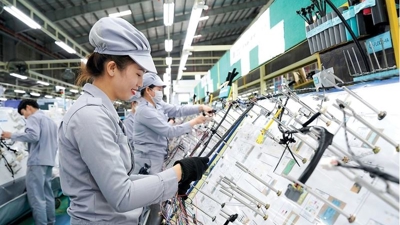Towards data economy development
General Luong Tam Quang, Member of the Politburo, Minister of Public Security, and President of the National Data Association, tells Vietnam Economic Times / VnEconomy about developing the data economy for a prosperous Vietnam.

What is the role and strategic vision of the National Data Association in developing Vietnam’s data economy, particularly in providing data-related resources to support research, startups, and innovation?
At the First National Congress for the 2025-2030 tenure of the National Data Association, held on March 22, 2025, in a keynote address, Party General Secretary To Lam expressed his belief that the Association would become the “Home for Digital Knights” and a “Pioneer” in the implementation of Politburo Resolution No. 57 and other resolutions on science and technology, thereby helping Vietnam become a digital nation, with digital governance, a digital economy, and a digital society developed on a foundation of Vietnamese data that is “accurate, sufficient, clean, and livable.”
He also assigned seven key missions to the Association. These include conducting research and proposing improvements to the legal framework surrounding data; playing a core role in building, developing, utilizing, and enriching national data; proactively adopting, mastering, and gradually becoming self-reliant in core data technologies, particularly AI, big data, blockchain, and cloud computing; supporting the advancement of modern data infrastructure; strengthening international cooperation, learning from global experiences, mobilizing resources, and participating in global data initiatives; establishing effective enforcement and monitoring mechanisms; and ensuring data security by developing secure systems, products, and services, formulating data security standards, and nurturing an industry around data security.
Importantly, the Party General Secretary emphasized the Association’s role in several key programs and initiatives. These include developing a data market for sustainable development; building a national open AI platform; rapidly promoting data literacy among the general public; organizing innovation challenge competitions based on data; and continuously enhancing national capabilities in data technology self-reliance.
Its strategic vision is to collaborate with relevant agencies and organizations to gradually achieve sovereign, secure, and transparent control over data, thereby driving socio-economic development and safeguarding national sovereignty, interests, and cybersecurity in cyberspace.
The Association also emphasizes four core values of data. These are security and safety - ensuring data is not compromised, stolen, or manipulated by foreign forces or cybercriminals; innovation - enabling optimal data utilization to unlock innovation and create added value across economic sectors; responsibility - as data is tied to public and community interests, its use must comply with the law, respect ethics, protect privacy, and uphold cultural values; and collaboration - promoting consensus, knowledge sharing, and resource connectivity to build a comprehensive, sustainable, and internationally-competitive data ecosystem.
What is your perspective on the Association’s role in accelerating digitalization, transforming business models, and developing a sustainable data market?
With the mission of acting as a bridge between the State, businesses, and the community, the National Data Association plays an important role in fostering a dynamic, transparent, and sustainable data ecosystem. It contributes to connecting different economic stakeholders in participating in the data market and promotes the formation of a data economy ecosystem, in which data is recognized as an asset that can be valued, traded, and reused.
The Association represents the voice of businesses and the data community, protects the rights and interests of its members, and proposes mechanisms and policies to promote the development of the data industry. It contributes to building a transparent and consistent legal framework for the data economy, particularly in matters concerning data ownership, sharing, and personal data protection. It also plays a part in improving training capabilities and enhancing the quality of high-skilled data professionals.
It also participates in fostering innovation and technology transfer in the field of data, encourages the development of open data mining and analytics platforms, strengthens international cooperation, and facilitates the transfer of technology from developed data economies around the world.
As a national-level socio-professional organization, the National Data Association will actively engage in policy consultation and the improvement of laws and regulations related to data security and safety. It will continue to act as a bridge between the government, businesses, and citizens by organizing seminars, dialogues, and forums to share challenges in data management, research, teaching, business, application, and development. Through these platforms, the public can raise concerns regarding personal data protection, and State agencies can introduce upcoming policies, thereby contributing to the formation of a transparent and civil “culture of data use” and enhancing public trust.
The Association will take the lead in coordinating with government bodies, political system agencies, and the business community to research, develop, and implement solutions that ensure data security and safety, cybersecurity, and information safety in the face of increasing risks and challenges in today’s environment.
To realize its role, mission, and strategic vision, what key tasks will the Association focus on in the immediate future?
The Association will soon focus on collaborating with relevant agencies and organizations to effectively implement the strategic directions of Party General Secretary To Lam, with the following key priorities.
First, it will conduct research and make proposals to help improve the legal framework for data, creating favorable conditions for data to be collected, circulated, connected, shared, and fully utilized while still ensuring data security, safety, and sovereignty. It will participate in building institutions for data development, including data products and services, the data market, and the data economy. The Association will propose the establishment of ownership rights and the management, processing, valuation, and distribution of data. It will also review and recommend policies and mechanisms that encourage and incentivize investment in the data sector and market, especially the development of data application models. Furthermore, it will make recommendations to State agencies on introducing breakthrough policies to attract FDI from global technology corporations and on promoting the participation of domestic and international enterprises in startups and investment in Vietnam’s data market. At the same time, it will research and develop products and services that ensure data security and personal data protection.
Second, the Association will concentrate on developing four key categories of data: human data, location data, activity data, and object data, in order to serve socio-economic development, management, governance, and national defense and security.
Third, it will strengthen the application, mastery, and eventual autonomy of core data technologies, particularly AI, big data, blockchain, and cloud computing. It will focus on developing core data products as directed by the government, including the National Data Sharing and Coordination Platform, the National Data Exchange, the National Blockchain Platform, National Decentralized Identity Solutions, the National Email System, the National Virtual Assistant, the National High-Performance Computing Center, and the National Digital Asset Exchange.
Fourth, the Association will work to build modern and advanced data infrastructure that is proactively invested in to lay the foundation for digital transformation. It will concentrate resources on the operation of national databases and the four pillar datasets: human, product, location, and activity. Alongside the National Data Center, it will expedite the development and completion of databases that support digital economic and digital society development, especially in agriculture, industry, commerce, energy, cultural heritage, national monuments, social insurance, labor markets, education, healthcare, transportation, and natural resources and the environment.
Fifth, it will enhance international cooperation, learn from global experience, attract resources, and participate in global data initiatives. It will promote information exchange, knowledge sharing, and the application of advanced technologies; selectively absorb international best practices suited to Vietnam’s conditions; and gradually build a unique “Vietnam Data” brand based on set principles.
Sixth, the Association will build effective implementation and supervision mechanisms for data management. It will coordinate with relevant agencies and organizations to establish and operate a more synchronized and rigorous supervision system powered by advanced digital technologies to ensure full and effective legal compliance within the scope of the Association’s duties.
And seventh, it will develop systems and products for data security, foster data security services, and establish standards for data protection to form an industry dedicated to this field. It will enhance the safeguarding of data sovereignty and security by applying advanced digital technologies and participating in the formulation and refinement of regulations to prevent and counter any attacks, intrusions, or data theft targeting national or sectoral databases







